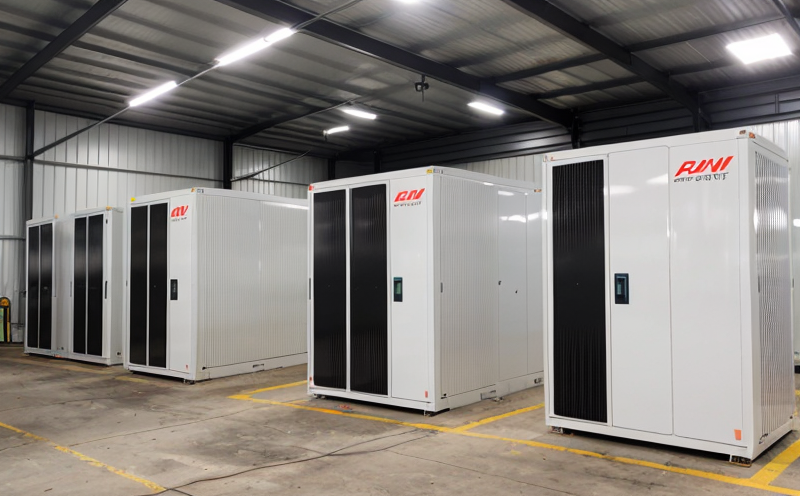ISO 12405-2 Reliability Testing of Lithium-Ion Battery Modules
The ISO 12405 series provides a comprehensive framework for the testing and evaluation of lithium-ion batteries, focusing on safety and reliability. This service specifically targets the reliability testing of lithium-ion battery modules, ensuring that they meet stringent standards set by international bodies.
Lithium-ion battery modules are integral to various energy storage systems (ESS) and electric vehicles (EVs). Their performance directly impacts the longevity, efficiency, and safety of these systems. The ISO 12405-2 standard defines a series of tests designed to evaluate the reliability of lithium-ion battery modules under simulated operational conditions.
The testing process involves multiple stages that simulate real-world usage scenarios. These include high-rate discharge (HRD), extended cycle life, and charge retention tests. Each test is conducted using standardized protocols that ensure consistency across different manufacturers and models. This approach helps in identifying potential weaknesses early on, allowing for necessary adjustments before large-scale deployment.
One of the key features of this service is its ability to replicate extreme conditions that a battery module might encounter during its lifetime. By subjecting the modules to controlled heat, cold, vibration, and overcharge scenarios, we can assess their durability and robustness. This ensures that customers receive reliable data about how well the batteries will perform in actual use.
The testing procedure begins with thorough preparation of the battery module. Specimens are carefully selected based on the intended application—whether it’s for automotive or stationary storage systems. Once prepared, they undergo a series of tests aimed at simulating both normal and abusive conditions. The data collected during these trials provides insights into various aspects such as capacity fade, internal resistance changes, and overall stability.
Our laboratory adheres strictly to ISO 12405-2 guidelines throughout the entire testing process. This includes using specialized equipment calibrated according to international standards like ASTM D7896 for electrochemical impedance spectroscopy (EIS). The use of such precise instruments ensures accurate measurements and reliable results.
The outcome of these tests is not just a simple pass/fail judgment but detailed reports that outline the performance metrics of each module. These documents serve as valuable references for manufacturers during product development stages, helping them refine designs and enhance quality control measures.
By leveraging ISO 12405-2 reliability testing services, organizations can significantly improve their confidence in the reliability of lithium-ion battery modules used within their products or projects. This translates into better customer satisfaction, reduced warranty costs, and enhanced brand reputation.
In summary, ISO 12405-2 reliability testing offers a robust platform for evaluating lithium-ion battery modules against global standards. It plays an essential role in ensuring that these critical components meet the highest levels of quality and safety expectations.
Why Choose This Test
The decision to opt for ISO 12405-2 reliability testing is driven by several compelling reasons:
- Comprehensive Coverage: The test encompasses a wide range of parameters that are crucial for assessing the performance and longevity of lithium-ion battery modules.
- Global Recognition: Adherence to internationally recognized standards enhances credibility both domestically and internationally.
- Predictive Insight: By identifying potential issues early on, manufacturers can make informed decisions about design improvements before full-scale production begins.
- Cost Efficiency: Early detection of defects through rigorous testing reduces the likelihood of costly recalls later down the line.
The service also offers a unique opportunity for companies to demonstrate their commitment to excellence, thereby gaining competitive advantages in today’s highly regulated market environment.
Quality and Reliability Assurance
Ensuring top-notch quality and reliability is paramount when dealing with lithium-ion battery modules. Our ISO 12405-2 reliability testing service guarantees that every aspect of the battery module undergoes thorough scrutiny, ensuring compliance with all relevant standards.
The initial step involves a comprehensive inspection of each specimen to ensure it meets specified criteria outlined in the standard. This includes checking physical dimensions, electrical characteristics, and other essential attributes. Only those units deemed suitable proceed further into the testing phase.
During the actual testing process, multiple protocols are employed to simulate diverse operating conditions that batteries might encounter during their lifecycle. For instance, high-rate discharge tests measure how quickly a battery can deliver its stored energy without compromising safety or performance. Similarly, extended cycle life tests assess the ability of the module to withstand repeated charging and discharging cycles over prolonged periods.
Another important aspect is the evaluation of charge retention capabilities. This test determines the percentage of remaining charge after long storage intervals, which is critical for maintaining optimal performance in applications like electric vehicles or renewable energy systems.
The results from these tests are meticulously recorded and analyzed to provide detailed reports highlighting both strengths and areas requiring improvement. These findings play a vital role in guiding future design iterations and enhancing overall product quality.
Our commitment to excellence extends beyond just meeting the required standards; it involves continuous innovation and adaptation to emerging trends within the industry. By staying ahead of technological advancements, we ensure that our clients receive cutting-edge solutions tailored specifically to their needs.
Competitive Advantage and Market Impact
Adopting ISO 12405-2 reliability testing offers several strategic advantages that can significantly enhance a company's position in the competitive market:
- Innovation Leadership: By staying ahead of regulatory changes and technological advancements, companies gain a competitive edge.
- Customer Trust: Demonstrating adherence to stringent international standards fosters trust among consumers who value reliability above all else.
- Cost Savings: Early identification of issues through comprehensive testing reduces the need for costly repairs or replacements later on.
- Better Brand Reputation: Consistently delivering high-quality products improves brand image and attracts more customers over time.
In today’s rapidly evolving energy sector, maintaining a strong focus on reliability is crucial. ISO 12405-2 reliability testing helps companies achieve this by providing them with the tools needed to create trustworthy, dependable solutions that meet current and future demands.





